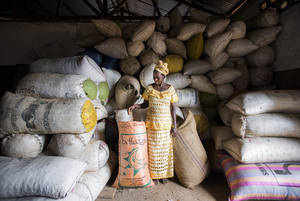|
Harnessing rather than suppressing informal trade can give Africa a boost
Monday, 2017/05/29 | 14:49:06
|
FAO study offers policy guidance for linking half of all cross-border trade to development goals.
Figure: Seeds for sale in Sierra Leone.
FAO 25 May 2017, Kigali - Africa's vast but informal cross-border trade can contribute to improving livelihoods and increasing regional integration across the continent, according to a new report presented at a conference here.
Informal cross-border trading, in which transactions are not compliant with local tax and other rules, accounts for a large share - between 20 and a hefty 70 percent - of employment in sub-Saharan Africa, and putting it on a regular footing can lift sustainable prosperity and markedly improve prospects for women, says FAO's new publication, "Formalization of informal trade in Africa".
Around half of all intra-African cross-border trade is classified as informal, indicating its large if officially invisible role. Proactive policies that recognize such activity, tapping its potential with the aim of steering it towards proper regulatory status, are to be preferred over heavy-handed approaches to eradicate or seek rents from entrepreneurs, according to FAO.
"Facilitating formalization is the only viable policy option for Africa's transformation agenda to realize its objectives," says Suffyan Koroma, FAO senior economist and lead author of the report.
"Despite the significant contribution of the informal sector to African economies, the policy makers quite often have no information on ICBT due to lack of quality data, this has hampered the development of supporting policies to the sector," said Clement Onyango from the Nairobi chapter of Consumer Unity and Trust Society, a non-governmental organization that is co-hosting the conference with FAO.
A huge role for women
Informal cross-border trade activity is largely a second-choice option taken by people in the absence of clearly defined formal alternatives. It consists of trade in goods and services, often agricultural in nature, and in times of food crises and other shocks has proven to be more responsible than legal channels.
Off-the-radar economic activity, not all of it involving international trade, accounts for around 40 percent of GDP in Africa, higher than in Latin America or Asia.
The trade is rarely illegal. In most cases it is informal because practitioners have poor access to all the appropriate business licenses, administrative skills and knowledge of import and custom-tax laws to act otherwise. While such activity is an important source of household income, practitioners are often prey to corruption and their weak access to credit means their activities are rarely stable or sustainable.
Women constitute the largest share of such informal traders, comprising more than half in Western and Central Africa and about 70 percent in Southern Africa, the FAO report found.
Patterns differ by region: In Tanzania, women dominate trade in manufactured products while men handle mostly raw or semi-processed agricultural products, whereas the opposite is the case in Cameroon. Women and men tend to differ in which foodstuffs - fresh produce or commodity staples - they trade as well. Appropriate policies must take such facts into account.
The Kigali conference is part of ongoing FAO-supported work in the country, along with UN Women and other development partners, aimed at enabling women to benefit more from agri-food chains, a project geared to allowing women small traders access useful information as well as start-up capital.
Local agricultural produce and livestock account for two-thirds of Rwanda's exports, most of which are informally traded, with the bulk going to neighboring countries, notably the Democratic Republic of Congo. Rwanda encourages informal small traders to form cooperatives as a step towards regularization.
Women trading between the border posts of Kenya and Uganda and between Rwanda and Burundi prefer to use brokers who appear to shield them from what they perceive as unprofessional behavior of customs officials, the report notes.
FAO, working with Catholic Relief Service, has also organized open-door events on the Rwanda-Congo border where women cooperatives were invited to learn more about the cross-border tax regime directly from custom officials and government representatives.
"Rwanda has emerged as a model of best practice for cross border trade through its efforts to integrate the informal economy by easing trade channels for small-scale agricultural traders,"said Attaher Maiga, FAO's Representative in Rwanda.
Policy recommendations
Aware that "ICBT-blindness" in national and regional trade policies and poverty reduction strategies may be hampering progress, African governments are increasingly making efforts to identify dynamics in the sector. In Uganda, both the Bureau of Statistics and the central bank monitor such flows and the government is discussing whether an approach focusing on quality control and value-added potential so that traders can earn more should take priority over a laisser-faire approach or actions aimed at suppression.
Key priorities to facilitate the formalization of informal cross-border trading according to FAO, include the simplification of licensing requirements, tax incentives, fostering partnerships, radio, television and town-hall outreach to participants in the informal economy, and intensifying efforts to tackle official corruption.
|
|
|
|
[ Other News ]___________________________________________________
|


 Curently online :
Curently online :
 Total visitors :
Total visitors :




















